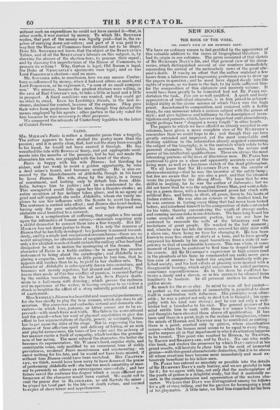FAZIO.
MR. MILMAN'S Fazio is rather a dramatic poem than a tragedy.
The author appears to have studied the poetry more than the passion ; and it is pretty clear, that, had not the story been wrought to his hand, he would not have carried it throagh. He has wreathed the tale with flowers of fancy, and put appropriate senti- ments into the mouths of the persons; but he has not made the characters his own, nor grappled with the heart of the story.
Fazio is happy with his wife Bianca; but thirsting for riches, and too weak to resist a golden opportunity, he robs a dead miser's hoard, and becomes wealthy. He is also en- snared by the blandishments of Aldabella, though in his heart he loves Bianca. His wife, stung by the injury, in a frenzy . of resentment, and looking only to detach him from Alda- bella, betrays him to justice ; and he is condemned to die. This unexpected result falls upon her like a thunder-stroke ; an entire revulsion of her feelings takes place, and in an agony of grief and self-reproach she seeks Aldabella, whom she vainly im- plores to use her influence with the Senate to avert his doom. The sentence is carried into effect ; and Bianca dies heart-broken, having only the poor satisfaction of seeing her depraved and obdurate rival banished to a convent.
Here is a complication of suffering, that supplies a fine moral
upon the infirmities of human nature,—materials requiring only a skilful dramatist to convert them into a fine tragedy. But Mr MILMAN has not done justice to them. It is only the remorse of Bianca that he has fully developed: her jealousy is aroused too sud- denly, and by a single and unequivocal circumstance—there are no -secret misgivings, no alternations of suspicion and confidence, but only a few childish words of doubt (which the raillery of her husband dissipates) to set in motion the mainspring: of the drama. The character of Fazio is a feeble outline—he is merely the passive instrument to bring about the catastrophe; and Aldabella is so glaring a coquette, and takes so little pains to lure him, that he appears still weaker than he is, to yield to her shallow arts. The character of Aldabella is subsequently drawn into caricature, and becomes not merely repulsive, but absurd and unnatural. The havoc thus made of this line confiiiit of passion, is carried further by the sudden transition, in the last act, from Fazio's death- scene to a ball-room with dancing ; which proves the rashness and inexperience of the writer, in having recourse to so N inlent a shock to heighten the effect of a story naturally powerful and full of excitement.
Miss KEMBLE'S Bianca is a beautiful and successful performance; for she has chiefly to play the true woman, which she does to ad- miration. She conceives and embodies natural and domestic cha- racters—in which love, jealousy, or bitter sorrow are to be ex- pressed—with much force and truth. She fails in the conventional and the grand—when her want of physical capabilities to give due effect to her representations of dignity, power, or sublimity, forces her to get upon the stilts of the stage. But in expressing the ten- derness of true affection spirit and delicacy of feeling, or an arch and playful earnestness, the tones of her voice and the ardency. of her manner excite a thrill of sympathy, which testifies the genuine- ness of her acting. The more natural the character, the better she becomes its representative. Mr. WARDE'S hard, angular style, and unmitiesable voice, only modified by an occasional tone of sickly peevishness, rendered Fazio monotonous and uninteresting: we cared nothing for his fate, and he would not have been missed, if without him Bianca could have been wretched. Mrs. CHATTER- LEY, we think, would have been sorry to have deserved the praise of performing Aldabella well: she has too much amiability of man- ner to personify, so odious an extravaganza successfully ' • and her failure saved the audience the disgust which a more. efficient per- formance of the character would have excited. We one-ht not to omit the praise due to BLANCHARD. as old Bartolo the miier : he played his brief part- to the life—or death rather, arid seemed
to expire of sheer terror and apprehension. a.


























 Previous page
Previous page